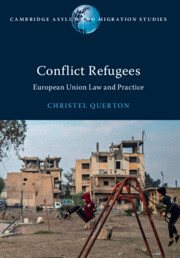Book contents
- Conflict Refugees
- Cambridge Asylum and Migration Studies
- Conflict Refugees
- Copyright page
- Contents
- Tables
- Series Editor’s Preface
- Acknowledgements
- Table of Cases
- Table of Treaties and Other International and Regional Instruments
- Abbreviations
- 1 Introduction
- 2 The Legal Framework
- 3 Contemporary Armed Conflicts, Violence and Gender in International Refugee Law
- 4 Judicial Constructions of Risk on Return to Situations of Contemporary Armed Conflict
- 5 Judicial Constructions of ‘Well-Founded Fear of Being Persecuted’ in Situations of Contemporary Armed Conflict
- 6 Judicial Constructions of the Refugee Convention Reasons for Persecution in Situations of Contemporary Armed Conflict
- 7 Conclusion
- Appendices
- Bibliography
- Index
3 - Contemporary Armed Conflicts, Violence and Gender in International Refugee Law
Published online by Cambridge University Press: 20 July 2023
- Conflict Refugees
- Cambridge Asylum and Migration Studies
- Conflict Refugees
- Copyright page
- Contents
- Tables
- Series Editor’s Preface
- Acknowledgements
- Table of Cases
- Table of Treaties and Other International and Regional Instruments
- Abbreviations
- 1 Introduction
- 2 The Legal Framework
- 3 Contemporary Armed Conflicts, Violence and Gender in International Refugee Law
- 4 Judicial Constructions of Risk on Return to Situations of Contemporary Armed Conflict
- 5 Judicial Constructions of ‘Well-Founded Fear of Being Persecuted’ in Situations of Contemporary Armed Conflict
- 6 Judicial Constructions of the Refugee Convention Reasons for Persecution in Situations of Contemporary Armed Conflict
- 7 Conclusion
- Appendices
- Bibliography
- Index
Summary
Chapter 3 proposes an original conceptual framework built on gender and security studies and supported by existing international legal standards and norms to reframe the interpretation of the refugee definition and better reflect the nature of violence in armed conflicts. In doing so, it reasserts the Refugee Convention as the cornerstone of international protection. This chapter claims that the ongoing dynamics of violence in situations of armed conflict provide a more valuable lens to interpret the Refugee Convention definition where persons flee armed conflicts as it focuses on the nature of violence, including its continuum, features, application, direction, motivation and impact. A micro-level analysis of this type also enables the identification of gender dynamics that are essential in understanding violence in armed conflicts. The framework outlines the knowledge that should be incorporated into the process of interpreting the refugee definition to ensure effective protection of refugees fleeing armed conflicts. The chapter is broken down into the characteristics of contemporary armed conflicts and how these features relate to the refugee definition, including the temporality of armed conflicts, the rise of non-state actors, weak states, and the objectives, gendered strategies and tactics of fighting parties.
Keywords
- Type
- Chapter
- Information
- Conflict RefugeesEuropean Union Law and Practice, pp. 50 - 70Publisher: Cambridge University PressPrint publication year: 2023



